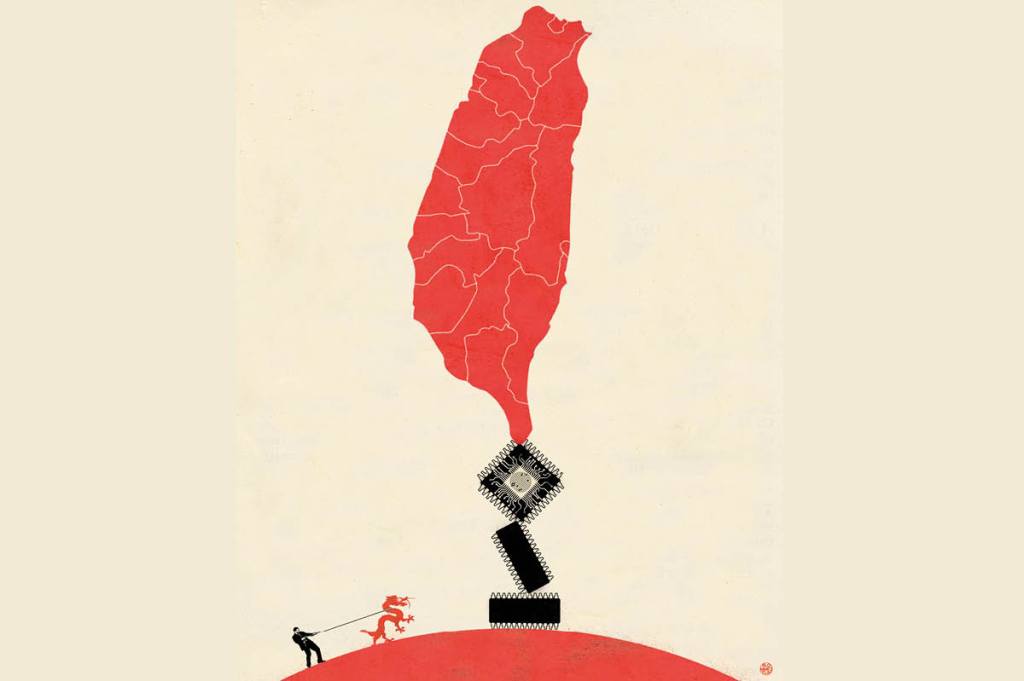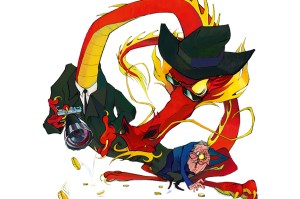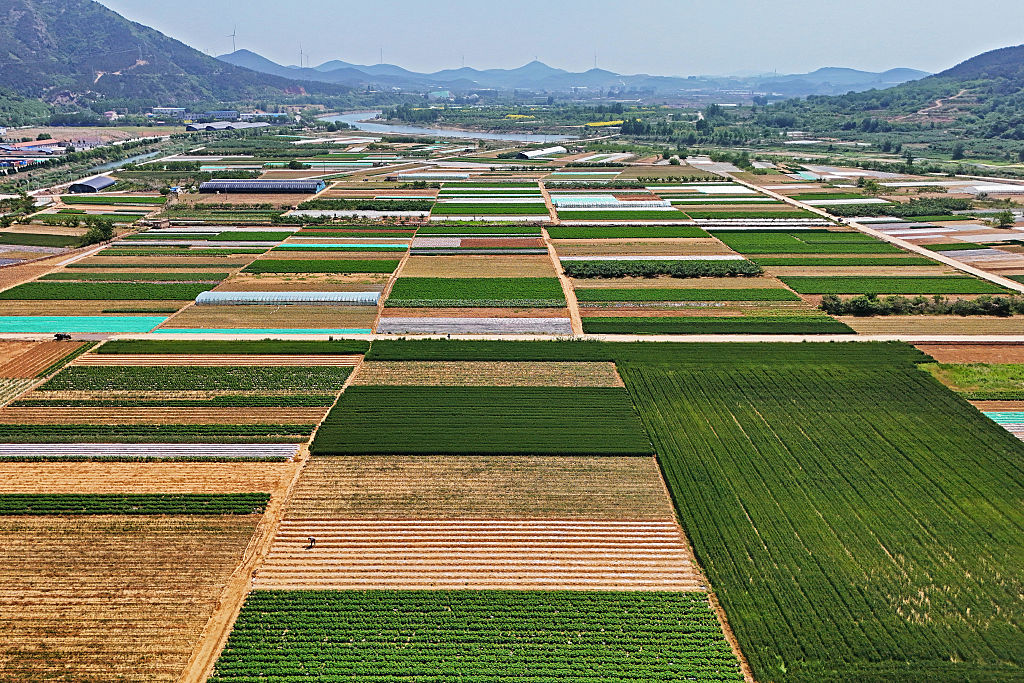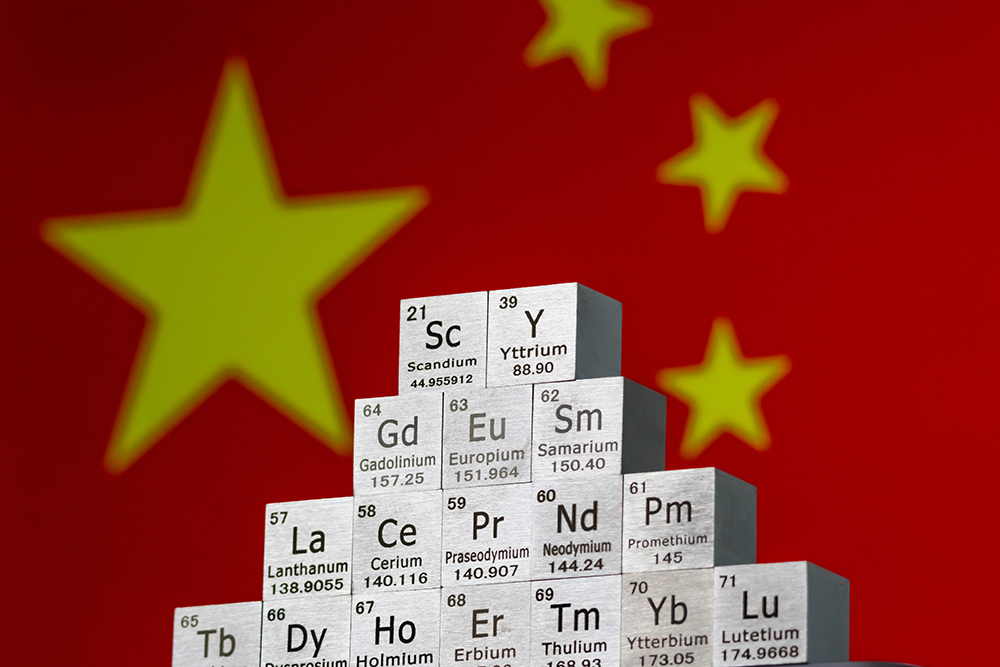On a recent trip to Taiwan as a guest of its Ministry of Foreign Affairs, I knew that war with an increasingly belligerent China is a daily possibility. Chinese ships are in constant circulation in the Taiwan Strait. Chinese aircraft unceasingly fly near the island, getting close to Taiwanese air space. Beijing’s increasingly threatening language about forced “unification” seems to bring a catastrophic attack closer. Genuine fear fluttered in the wake of Nancy Pelosi’s visit in August last year when China launched three days of drills that paid no regard to what they called the “imaginary” median line, which divides Chinese from Taiwanese territory.
On the surface, Taipei appears to be preparing for the worst — making, then keeping, friends as close as possible, with none deemed too insignificant. Journalists from Taiwan’s scant list of official allies, including Eswatini (formerly Swaziland), Paraguay, St. Kitts and Nevis and Belize, had been invited on my trip. Even Liz Truss, briefly British prime minister last year and a figure of ridicule in the UK and Europe, was welcomed in May with open arms by officials for a Pelosi-redux-style visit.
In numerous overly air-conditioned meeting rooms in government buildings, I and the other journalists on the trip were assured that Taiwan’s military is being beefed up. We were reminded that Taiwan is due to take delivery of its first Lockheed-made F-16 fighters any day. And, while the authorities were committed to maintaining the status quo, it was clear to us that officials serving Taipei’s nationalist ruling DPP party were not afraid to use the punchy, anti-China language of independence and self-defense. Ministers fumed eloquently about their “bad” neighbor, its poor moral character, its pervasive use of “cog war.” Several said that countries hoping to gain something, particularly major infrastructure projects from partnerships with China should not “expect anything.” In one briefing with Joseph Wu, the foreign minister, a German journalist asked if perhaps, as people came to wonder of Putin after he invaded Ukraine, Xi Jinping was simply “irrational.” “If you say he’s crazy, maybe he’s crazy,” replied Wu, with a surprisingly devil-may-care chuckle.
But beneath the rhetoric, preparedness seems strangely weak — denialist even. The question of how prepared Taiwan really is for an attack from China — and how far it is relying on the US to swoop in and save it — was asked over and over by our group. In return we heard plenty of bluster about the need to be able to defend fully before asking for help. “We will fight as long as China wants to fight,” said Shen Mingshih of the Defense Ministry-funded Institute for National Defense and Security Research Institute (NDSRI).
But we were left with little in the way of concrete evidence to back up officials’ assurances. Militarily, Taiwan does not project readiness. It spends just 2.4 percent of its GDP on defense, compared to 3 percent in the US, 4 percent in Poland and 5 percent in Israel. This despite the catastrophic outcome for the country likely in the event of invasion, according to the most thorough war game simulation run to date, by Washington’s Center for Strategic and International Studies. True, Taiwan has increased conscription from just four months to one year for men, who can fit it around their studies, and women can for the first time join reservist training. And there is a resigned sense, even in officialdom, of having been here before… indeed, forever.
The mood in Taiwan was fatigue, not urgency. The sense that people are just over it was palpable. The country has been living in a state of proto-war for decades, and long-term Chinese antagonism has seen Taiwan shut out of most of the world’s clubs including the United Nations (including Taiwanese journalists); the World Health Assembly, the decision-making body of the WHO; Interpol and the International Civil Aviation Organization.
And outside of the big, freezing briefing rooms of the corridors of power, Taiwan felt almost sleepy — neither interested in or remotely ready for the kind of heartfelt, all-in war that would be required, even with US assistance, should Beijing decide to bring it back into the fold by force. People were sweet, gentle, generous — and thoroughly bored by my questions about a possible Chinese attack. Again and again I heard that they are not scared, that they have been facing this threat for decades. A thirty-two-year-old barista in Tainan, Taiwan’s oldest city with a heavy Japanese influence, said he and his friends simply felt “numb” when Chinese planes flew overhead and that it was a matter “between governments.”
Jessica, a twenty-eight-year-old public relations executive for a five-star hotel on Sun Moon Lake in the rural heart of the island, just laughed lightly when I mentioned Western tenterhooks about the China-Taiwan situation, making my earnest question about her fears of Chinese attack seem strangely out of touch, the question of a foreigner who has read too many headlines. Still, she was no fan of China, and told me about how she and her friends are hassled by Chinese airport staff when they fly in and out of the mainland, forced to show their phones and delete any China-critical material. It seemed that this behavior inspired disapproval, but not fear.
Meanwhile in Taipei, the capital of what the Economist in 2021 called “the most dangerous country in the world right now,” there is a villagey feel, and the atmosphere outside the offices of state was tranquil, with cafés both old-world and hipster; traditional bakeries, the famed 7/11s on every block and small neighborhood parks. Hairdressers do a local riff on the blow-dry, offering a massage with the suds. At night food markets come alive, offering reflexology and nail work as well as roast whole squid, tofu, fried milk balls, dragonfruit milk, Michelin-guide-worthy fried chicken and Chinese sausage in a bun of rice. By day, sleek outlets selling Taiwan’s famous pineapple cakes sit alongside bookshops, and the tree-lined Reni’ai boulevard, a central artery that runs through the weekend flower and jade markets, is dark, breezy and quiet at night.
And since nothing has happened before, why should something happen now? “Geopolitics never changes, at least not in our short life,” said an INDSR researcher wearily.
The threat to Taiwan from the People’s Republic of China (PRC) dates to the early 1950s when Chiang Kai-shek, the Republic of China (ROC) dictator, tried and failed to conquer mainland China and fled to Taiwan to regroup. Taiwan and nearby islands became the assumed launch point for any attempted takeover of mainland China. Meanwhile the US, keen to stop the Korean War spreading south, moved into an aggressive position in the Straits of Taiwan, angering Beijing.
But things are considerably worse now. As a Taiwanese official put it in April: “When a national mission becomes one man’s mission, the danger rises.” The Russian invasion of Ukraine showed the world, including Taiwan and China, that a maddened dictator can break all the norms adhered to by a war-shy, morally indolent West. And Xi has a massive military at his command: the People’s Liberation Army is the largest in the world and has been feverishly modernizing. In March, China announced $225 billion in defense spending, a 7.2 percent rise on the previous year, and China has signaled, through rhetoric and reckless drills in sky and sea, that it is only a matter of time before it uses force to “reunify” with what it sees as a rogue territory.
Perhaps the biggest problem is that Taiwan is 98 percent dependent on imported fossil fuels, and has enough energy to last just ten days in the event of a full blockade without American assistance. Even with US help, not all battleships — such as those docked in Hawaii and California — are close enough at hand to see off disaster. But instead of focusing on this possible energy catastrophe, we heard instead about Taiwan’s ambitious plans for Net Zero by 2050, which currently involve pie-in-sky dependence on solar and wind, and measures such as making shopping malls use slightly less air conditioning. To the panic and chagrin of some onlookers, Taiwan is part of the unfortunate club of countries in the world to be winding down — not up — its nuclear power capacity.
But Taiwan is not playing dead either. It is modernizing its military by getting the most advanced technological systems to supplement its relatively modest army of 169,000 plus 1.66 million reservists. It has spent $23 billion on American weapons since 2019, and more than $5 billion in 2020 alone. Its homegrown Clouded Leopard tank system is state of the art, and it has bought a valuable stock of eleven M142 High Mobility Artillery Rocket Systems and 400 Harpoon anti-ship missiles from the US. Gwythian Prins, a defense analyst who did time at Britain’s Ministry of Defense and NATO, told me in London last month that Taiwan’s military is much better than anyone thinks.
The comparison, or rather the contrast, with Israel, which is also tiny, isolated from international affairs, delegitimized and under constant threat, is instructive. Where Taiwan’s active army is just 0.5 percent of its population of 25 million, Israel’s is 1.7 percent of its population — greater in number than Britain’s despite having one-seventh the population. Israel also, crucially, has a massive battalion of reserves, at 4.7 percent of its population, while Taiwan’s combat-ready reservists, as opposed to its much bigger cohort of men and volunteers who have been through just seven days of training, number only 400,000 — 1.6 percent of the population.
In Taipei, I saw just two signs for shelters, whereas in Tel Aviv alone there are so many shelters it’s hard to pick an individual one out of the crowd: the city’s 3D municipal map of them is so densely packed they’re uncountable.Why? I asked Richard Kemp, the retired British Army commander, former global terrorism advisor for the British government, and a specialist on the Middle East. He tells me over the phone from New York that Taiwan is “overly reliant on sophisticated technology, which may be at the expense of more traditional defensive means.
“One of the things they could do better is have a much larger defense force; maybe not regular, but along Israeli lines, a big army but with much bigger reserves,” explains Kemp. “China probably has the capability to overpower a significant amount of Taiwan’s defense tech, but it would be a real fight if the PLA landed in Taiwan and were faced with a very large number of defense forces.”
Kemp is a prominent critic of his own country’s increasing reliance on fancy technology to the detriment of its actual army, which is shrinking year-on-year. He argues that such an approach harms deterrence. “I wouldn’t be surprised if Taiwan had caught some of this disease from their interaction [with] Western players,” says Kemp.
Whenever I asked officials what Taiwan could learn from Israel, I got unconvincing answers. One NDSRI fellow simply chuckled, “We can’t afford to be as offensive as them” — and so they weren’t “sure yet” what there was to learn.
In a sense, he is right. Whereas young Taiwanese people have never known armed conflict, Israel is constantly locked in it. Every young person I spoke to in Taiwan looked thoroughly bored (though always patient) by my questions about a possible Chinese attack. At the train station in Hualien on the wild east coast, the twenty-four-year who sold me iced jasmine tea told me his conscription of four months had been “fun” but “a lot of paperwork” and that while some of his friends talked about the great threat, “I don’t think about it, no; probably nothing will happen.”
All of which points back to Taiwan’s real trump card: semiconductors. I got off a high-speed train (average speed: 186 mph) at Hsinchu station, about half an hour outside Taipei, and took a taxi to the Hsinchu Science Park, ground zero for world semiconductor supply, where I was due to have a meeting with Miin Wu, the founder and chairman of Macronix, a boutique chip firm he founded in 1989.
I was early, so I decided to stroll down the quiet main road to the gates of TSMC, the world’s largest semiconductor manufacturer. Sweatily arriving outside TSMC, I asked a security guard if I could take a picture. The answer was no, and as I moved away I saw him get on his walkie talkie. A few minutes later, another security guard asked if I was lost. I said I wasn’t, but almost immediately another man in hi-vis stopped in front of me on a scooter, handed me a helmet and gestured for me to climb on. My arms around this man’s waist, I was delivered back to the reception of Macronix to find the PR director, her assistant and the chairman all waiting for me, taking video and giggling. It was a friendly wrap on a telling episode of industrial vigilance, nerves — and pride.
Safely inside Macronix, I was shown around by Wu, who told me about Taiwan’s unique grasp on this industry, the way it’s rooted in a proud factory culture and, crucially, a many-decades head start in inventing and producing semiconductor chips. He attributes his own decision to return to Taiwan in 1989 from California with the reverse brain drain that brought some of the best electrical engineers in Silicon Valley — tired of the language barrier — to Hsinchu.
Taiwan’s semiconductor shield might keep it safe for now. But Wu predicts that in twenty years the US and China will have full supply chains of their own. How does he see the industry he helped create back in 1989 within the great geopolitical struggle for control of Taiwan? Does America need Taiwan to remain inviolate, and vice versa?
“In my opinion, nobody needs anything,” he says. “But… from the economy point of view, Taiwan is important to the world today, it has long been important to the world econ- omy. We were making simple things they need. Now we make complicated things.”
“I cannot shoot or run,” he adds. “All I can do is use my brain to make something new for the whole world.”
Which guarantees that the world will not willingly allow Taiwan to be crushed. But will that be true in twenty years, when other brains might be making new things for the world elsewhere? If Taiwan hasn’t been Israelified by then, at least where defense is concerned, it will have to rely on the goodwill of powerful allies.
This article was originally published in The Spectator’s September 2023 World edition.

























